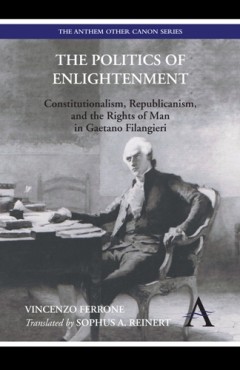The Politics of Enlightenment
Constitutionalism, Republicanism, and the Rights of Man in Gaetano Filangieri
By Vincenzo Ferrone
Translated by Sophus A. Reinert
- About This Book
- Reviews
- Author Information
- Series
- Table of Contents
- Links
- Podcasts
About This Book
Written by one of Italy’s leading historians, this book analyses the context and legacy of Gaetano Filangieri’s seven-volume Science of Legislation. The study engages with the unique history of Enlightenment Naples, the intellectual traditions upon which Filangieri drew, and the powerful repercussions of the American Revolution in eighteenth-century Italy to re-draw the map of Enlightenment republicanism and the early history of human rights and their political economy.
Particularly, the book elucidates Montesquieu’s polyvalent influence on the development of Enlightenment political philosophy, the intricate relationship between natural law and natural rights (later human rights), the emergence of an idiom and a theory of constitutionalism as the only safeguard against absolutist abuses and democratic excesses (whether due to communitarian zeal or the influence of charismatic leaders), and the importance of Freemasonry as a school of political theory and a locus of political action and re-action at the time. This brings the book to a lengthy discussion of the tensions between liberalism and poverty as well as patriotism and cosmopolitanism in the Italian republican tradition – themes all too relevant in today’s historiographical landscape – and Filangieri’s eventual contribution to these debates and to the institutionalization of the rights of man as a political category and an influence on political economy in Enlightenment Europe.
The second part of the book deals with Filangieri’s legacy, engaging both with his immediate acolytes, such as Francesco Mario Pagano, drafter of the Neapolitan constitution of 1799, and his detractors, such as the conservative Vincenzo Cuoco. The book ends with groundbreaking chapters on Filangieri’s reception in France and in Europe at large, focusing on Benjamin Constant’s little-understood critique of Filangieri and the tensions between the constitutional republicanism of the late Italian Enlightenment on the one hand and the nascent tradition of liberalism on the other. In doing so, this book not only explains the common roots of these two traditions, but also why they diverged and what consequences this had for Italian and European history.
Reviews
‘Essential reading for anyone interested in the European Enlightenment or the revolutionary movements of the eighteenth century.’ —Lynn Hunt, Eugen Weber Professor of Modern European History, UCLA
Author Information
Vincenzo Ferrone is Professor of Modern History at the University of Turin, Italy.
Sophus A. Reinert is Assistant Professor in the Business, Government, and the International Economy Unit at Harvard Business School.
Series
Anthem Other Canon Economics
Economic Ideas that Built Europe
Table of Contents
Foreword by Sophus A. Reinert; Preface: A World to Rediscover: The Enlightenment Origins of Modern Italian Republicanism; Part One: The New Politics ‘Ex Parte Civium’; 1. The Enlightenment and the Political Critique of the ‘Scientia Juris’; 2. The Critique of the British Constitutional Model and the Political Laboratory of the American Revolution; 3. Against Montesquieu and Class Constitutionalism: The Denunciations of the ‘Feudal Monster’ and the ‘Tempered Monarchy’; 4. Constructing a New Constitutionalism: Masonic Sociability and Equality; 5. The Neapolitan School of Natural Law and the Historical Origins of the Rights of Man; 6. Beyond ‘Reason of State’: The Moral and Religious Foundations of the New Politics ‘Ex Parte Civium’; 7. Nation or Fatherland? The Republican and Constitutional Patriotism of Italian Enlightenment Thinkers; Part Two: A Difficult Legacy; 8. The Original Character of Enlightenment Constitutionalism: From the ‘Scienza della legislazione’ to the 1799 ‘Progetto di constituzione napoletana’; 9. Vincenzo Cuoco: The National Critique of Cosmopolitan Enlightenment Constitutionalism; 10. The Liberal Constant against the Enlightened Filangieri: Two Interpretations of Modernity; 11. Filangierian Heresies in the European Democratic Tradition: The Principle of Justice and the Rights of Happiness; Notes; Index
Links
Stay Updated
Information
Latest Tweets



